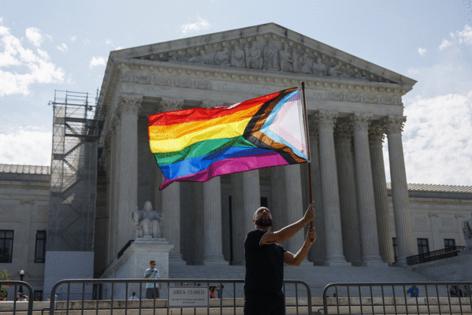Supreme Court dismisses long-shot challenge to right to marry for same-sex couples
Published in News & Features
WASHINGTON — The Supreme Court on Monday dismissed without comment a long-shot challenge to the constitutional right to marry for same-sex couples.
The justices turned away an appeal petition from Kim Davis, a former Kentucky county clerk who defied the court's landmark decision in 2015 and repeatedly refused to issue marriage licenses to same-sex couples.
She appealed after one couple sued and won $100,000 in damages plus attorneys fees for her deliberate violation of their constitutional rights.
She argued the court should hear her case to decide whether the free exercise of religion guaranteed by the 1st Amendment should have protected her from being sued.
Her appeal also posed a separate question she had not raised before in her long legal fight. She said the court should decide "whether Obergefell v. Hodges," which established the right to same-sex marriage, "should be overturned."
That belated question drew wide attention to her appeal, even though there was little or no chance it would be seriously considered by the high court.
Some LGBTQ+ advocates were concerned, however, because the conservative court had overturned Roe vs. Wade and the constitutional right to abortion in the Dobbs case of 2022.
Justice Clarence Thomas, writing for himself alone, said then "we should reconsider all of this court's substantive due process precedents, including Griswold, Lawrence, and Obergefell," referring to cases on the rights to contraception, private sexual conduct and same-sex marriages.
But other conservative justices had disagreed and said abortion was unique. "Rights regarding contraception and same-sex relationships are inherently different from the right to abortion because the latter (as we have stressed) uniquely involves what Roe ... termed 'potential life,' " Justice Samuel A. Alito Jr. wrote in his opinion for the court.
Justice Amy Coney Barrett in her new book "Listening to the Law" described the right to marry as a "fundamental right" that is protected by the Constitution.
"The complicated moral debate about abortion stands in dramatic contrast to widespread American support for liberties like the rights to marry, have sex, procreate, use contraception, and direct the upbringing of children," she wrote.
In July, the Williams Institute at the UCLA School of Law estimated there are 823,000 married same-sex couples in the United States and nearly 300,000 children being raised by them.
Davis had suffered a series of defeats in the federal courts.
A federal judge in Kentucky and the 6th Circuit Court of Appeals in Cincinnati rejected her claims based on the free exercise of religion.
Those judges said government officials do not have free speech or religious right to refuse to carry out their public duties.
"That is not how the Constitution works. In their private lives, government officials are of course free to express their views and live according to their faith. But when an official wields state power against private citizens, her conscience must yield to the Constitution," Judge Helene White wrote for the 6th Circuit Court in March.
Ten years ago, shortly after the court's ruling in Obergefell vs. Hodges, Kentucky's governor, the county's attorney and a federal judge all told Davis that she was legally required to give a marriage license to same-sex couples who applied for one.
She refused and said the county would issue no marriage licenses until she had been given a special exemption.
David Moore and David Ermold had been a couple for 19 years, and they filed suit after they were turned away from obtaining a marriage license on three occasions. Davis said she was acting "under God's authority."
A federal judge held her in contempt for refusing to comply with the law. While she was in jail, the couple finally obtained a marriage license from one of her deputies, but their lawsuit continued.
The Kentucky Legislature revised the law to say that county clerks need not put their name on the licenses issued by her office. Davis said that accommodation was sufficient, and she tried to have the lawsuit dismissed as moot.
The 6th Circuit refused because the claim for damages was still valid and pending. The Supreme Court turned away one of her appeals in 2019.
A federal judge later ruled she had violated the rights of Moore and Ermold, and a jury awarded each of them $50,000 in damages.
Mat Staver, founder of Liberty Counsel in Orlando, which advocates for religious freedom, appealed on her behalf.
His petition to the Supreme Court said the court should hear her case to decide whether the 1st Amendment's protection for the free exercise of religion should shield a public official from being sued "in her individual capacity."
The 6th Circuit Court rejected that claim in a 3-0 ruling.
"The Bill of Rights would serve little purpose if it could be freely ignored whenever an official's conscience so dictates," Judge White said.
"Indeed, it is not difficult to imagine the dire possibilities that might follow if Davis's argument were accepted. A county clerk who finds interracial marriage sinful could refuse to issue licenses to interracial couples. An election official who believes women should not vote could refuse to count ballots cast by females. A zoning official personally opposed to Christianity could refuse to permit the construction of a church," she said.
Judge Chad Readler, a Trump appointee, said even if public employees have some rights based on their religious views, "her conduct here exceeded the scope of any personal right. ... Rather than attempting to invoke a religious exemption for herself, Davis instead exercised the full authority of the Rowan County Clerk's office to enact an official policy of denying marriage licenses to same-sex couples, one every office employee had to follow."
©2025 Los Angeles Times. Visit at latimes.com. Distributed by Tribune Content Agency, LLC.







Comments